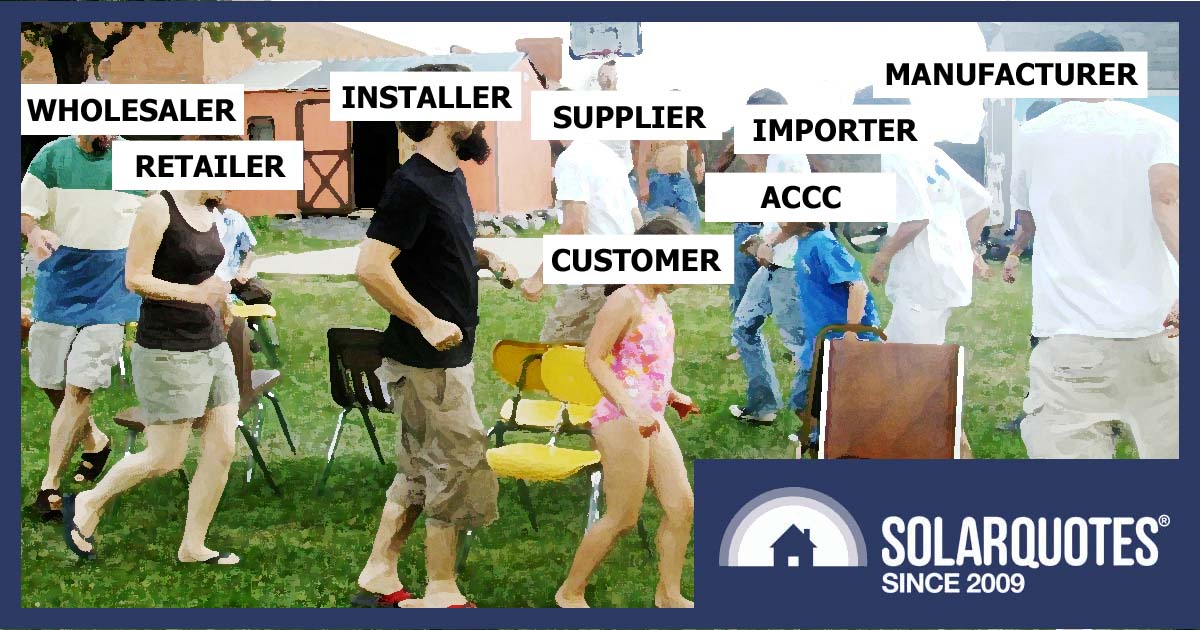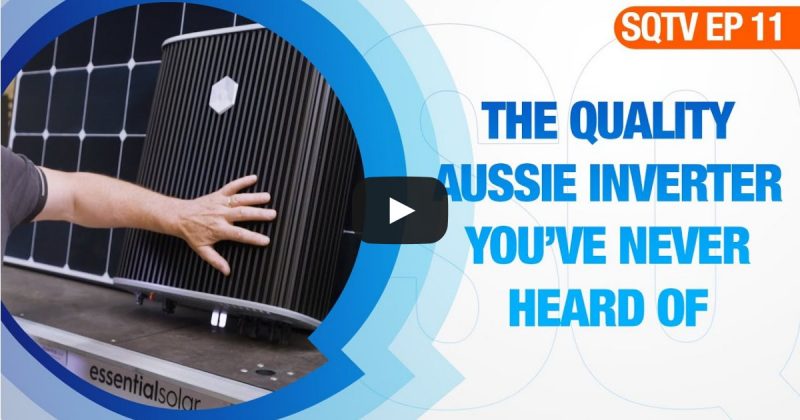Home Battery Warranties And Musical Chairs: When The Music Stops

What’s the difference between a home battery warranty and a game of musical chairs?
One is a situation in which people or things are moved, shuffled, or rearranged from one position to another, and the other is a game.
So, that’s a joke I made up (sound of slow clapping in the background). It’s not very funny for a couple of reasons. First, it’s simply not very funny, and second, it’s true.
Solar battery warranties, in fact warranties for many products sold in Australia, have more in common with musical chairs than you might think. What happens when the music stops?
Your warranty may not be so important or even worthless in some instances. SolarQuotes blogger Ronald has spent many a late night writing tragicomedies about this very subject1.
Why Might My Home Battery Warranty Be Worthless?
Well, for one, you don’t need it.
“Under the Australian Consumer Law (ACL), automatic consumer guarantees apply to many products and services you buy regardless of any other warranties suppliers sell or give to you.” (ACCC)
Isn’t it great to know the government has our backs… or has it?
The ACL is overseen and regulated by the Australian Competition & Consumer Commission (ACCC), and other consumer regulation authorities in your relevant state or territory. The trouble is they’re all a bunch of toothless tigers when it comes to small claims. If you have a problem, they can only advise you on the best course of action.
The so-called “automatic” consumer guarantees that apply are not, in fact, automatic. You’ve still got to do all the leg work. The ACCC won’t be holding your hand while you waste your time and money in the pursuit of justice.
Why Do Companies Offer Warranties?
So they can sell you stuff. It makes them look good if they appear to stand by their products even though they are required by law to do just that, even without a warranty.
Ok, so that may be a tad cynical (true nonetheless). There are also other reasons. For example, a warranty may give a clearer picture to the consumer of a particular product’s limitations by setting parameters in which the product should be used.
That’s (sometimes) fair enough. You trash their stuff, and you’ll pay the price.
A Game Of Musical Chairs
In the solar industry, there are many links in the chain when it comes to a warranty dispute. The pecking order goes something like this:
Customer > Installer/Retailer > Supplier > Distributor/ Importer > Manufacturer
The lines can be blurred. For example, the supplier may also be the importer. The installer may also be the retailer. Sometimes the manufacturer has an office in Australia, and sometimes not.
If you have a suspected problem with your home battery/system, your first port of call should be the installer or whoever sold you the product.
If the installer can’t resolve the issue, they will handball to the next link in the chain. In most cases, this will be the supplier or whoever they bought it from.
If the supplier has no joy, they will move on to whoever they bought it from. This will most likely be an overseas manufacturer or their Australian office if they have one.
Under Australian law, the importer or manufacturer’s Australian office is ultimately responsible for the product to be fit for purpose and to adhere to any additional warranties given. That’s where the buck stops. Australian jurisdiction starts and finishes at our shores.
Unfortunately, it’s not that simple because the installer/ retailer is also responsible, as they usually provide the warranties to their customers. In fact, everyone in the pecking order is liable to a certain degree, but no one wants to admit it because who likes to lose money after a hard day’s work? Not me.
From where I sit, the installer is in a very vulnerable position and is easily left carrying the can. Since they are the ones who provide the warranties, they quite often spend enormous amounts of time trying to resolve a situation if a dispute arises.
They are literally the meat in the sandwich, with potentially unhappy customers on one side and indifferent wholesalers/ distributors/ manufacturers on the other. The installer is often a small business that has a lot to lose.
On top of this, since solar power systems are comprised of a number of components, they are juggling multiple warranties from different manufacturers. If one of those companies isn’t around when shit hits the fan, the installer is liable.
True Battery Warranty Stories
The following are a couple of true stories I’m aware of involving solar battery warranty claims. I’d be interested to hear if you have any others to add to my list.
True Battery Warranty Story #1
A solar installer named Ted contacted SolarQuotes about a recent battery warranty claim he was dealing with. His real name isn’t Ted, but he’d rather stay anonymous, so Ted it is.
Ted had previously installed some batteries in a customer’s off-grid solar system, and they clapped out after only three and a half years. They had deteriorated to the point where they were only around 65% of their rated capacity.
When he talked to the distributor/ importer, they hand-balled it straight to the overseas manufacturer, who came back with: “Your batteries were undersized for the system”.
They initially refused to honour the warranty and stated it was “highly likely the capacity loss is a result of exceeding the maximum charge/discharge rate outlined in the documentation, resulting in irreparable cell damage”.
The thing is… the manufacturer (and so distributor/ importer) had changed the documentation and warranty conditions since these solar batteries were installed. Maybe they had learned a thing or two about real-world conditions since they launched their product. Who knows.
According to Ted, he had sized the batteries correctly according to the system design and manufacturer’s recommendations at the time. I haven’t seen the original warranty or installation documents, so I can’t verify either way.
Ted is an experienced installer of both off-grid and grid-tied systems. I’m hopefully optimistic he knew what he was doing. Anyway, being an all-round nice guy, Ted decided to loan some batteries to his customer to keep them afloat while he sorted out the mess.
In his own words, Ted was like a dog with a bone with this claim. After investing way too much of his precious time, he refused to let go. Eventually, the company in question decided that the potential fall-out was too great, so they came up with replacement batteries for his customer.
Ted is no longer installing solar batteries from this particular company. I suspect that regardless of who was in the wrong in this game of musical chairs, Ted will be designing his systems more conservatively with regard to battery sizing from now on.
True Battery Warranty Story #2
I’ve already written about this next warranty claim earlier this year, so here’s a quick recap. You can find all the juicy details here if you’re interested.
Judy (her real name) is an Australian wholesaler that sells products for solar PV, hot water systems and batteries. In 2017 she purchased and had installed an Alpha Storion OF5 Battery Backup system for her own use from the Chinese company AlphaESS, which has an office in Australia.
In December 2021, she reported a fault and the breakdown of the system to AlphaESS tech support. To cut a long story short – after four months of being given the runaround, including 24 emails and never being able to speak to a human on the tech support line, Judy finally decided to write to the ACCC and the Office of Fair Trading and see if they could help.
She received a reply from the Office of Fair Trading who stated they:
“Cannot force a trader to participate in conciliation and, unfortunately cannot help any further. If you wish to wish to pursue your complaint further, you can take action in the Queensland Civil and Administrative Tribunal, and/or get independent legal advice”.
That’s Australian Consumer Law to the rescue.
On the surface, this looks to me like a tactic employed by some companies of stalling in the hope that the customer will give up. Judy didn’t give up, and the faulty part in question finally landed on her doorstep. She also got an apology from Alpha ESS (in an attempt at PR damage control after we published the article?).
It’s Not All Bad News
It might all sound like doom and gloom, but these stories are almost certainly the exception rather than the rule. For every bad warranty story, there are probably many good ones that no one hears about. As they say – “good news doesn’t sell newspapers”.
In fact, for every solar installation that goes ahead, the chances of a warranty claim arising in its lifetime are very low. How low, I couldn’t tell you. As far as I know, there are no statistics on this. Correct me if I’m wrong. When it comes to home batteries, however, it’s too early to tell. As Ronald says – it could be a ticking time-bomb.
So how about sharing your solar and battery warranty stories? – the good and the bad. Maybe you know an installer who has gone above and beyond his/ her call of duty. On the other hand, you could be in the middle of a giant shit fight, and you’d like to blow off some steam. I’m all ears.
Footnotes
- Some of Ronald’s warranty stories:
Original Source: https://www.solarquotes.com.au/blog/home-battery-warranties/


















